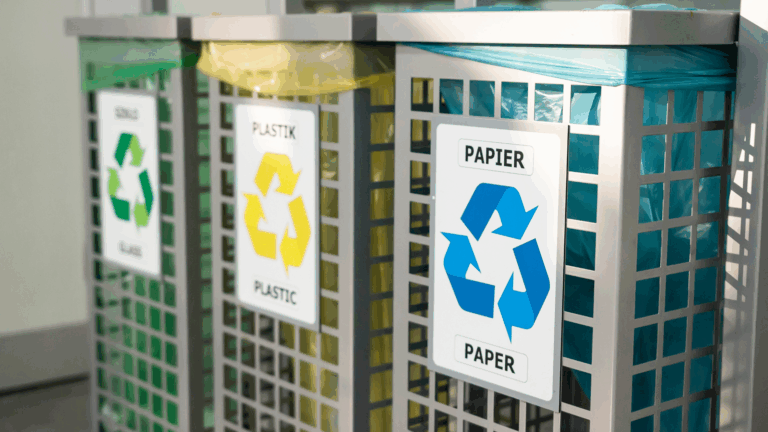
Recycling helps businesses save on overheads and improve sustainability in the long run
For decades, recycling has been an essential part of waste management. However, in the face of mounting environmental concerns, its importance has never been more apparent. Today, recycling is an essential requirement for organisations of all shapes, sizes and sectors – not just in the UK but globally.
With that in mind, let’s take a closer look at commercial recycling, highlighting the best practices that companies can adopt to foster a sustainable future.
Understanding the recycling landscape
The first step to mastering recycling is awareness. By converting waste materials into new products, businesses can reduce the need to consume raw resources. This helps to conserve energy, as well as reducing your business’s carbon emissions. From metals and glass to plastics and paper, lots of materials can be recycled with the right infrastructure and practices in place.
Modern businesses have both an obligation and an opportunity to make recycling a key part of their daily operations. By adopting and promoting best recycling practices, your business can pave the way for a more sustainable and eco-friendly future.
Best practices for commercial enterprises:
Comprehensive waste audit
Begin with a thorough audit to identify the types and volumes of waste your business generates. This will provide a clear picture of current recycling opportunities and areas needing improvement.
Establish clear recycling protocols
Clearly define what materials are recyclable in your business context. Train your staff on proper separation methods and ensure these protocols are easy to follow.
Use clear signage
Visual cues play an essential role in effective recycling. Use signs, color-coded bins and labels to guide employees and visitors.
Collaborate with a reputable recycling partner
Working alongside recycling companies can improve your businesses’ transparency and responsibility, giving you access to insights, resources, and tailored support.
Reduce contamination
Contamination can reduce the quality of recyclables, making them harder to process, so make sure that recyclables are free from food residues, liquids, and non-recyclable materials.
Stay updated with recycling trends
The recycling industry is ever-evolving. New technologies and methodologies arise regularly. Stay informed and adapt your practices accordingly.
Invest in on-site recycling equipment
If your business generates significant amounts of recyclable waste, you should consider investing in on-site equipment such as balers or compactors, as a way to streamline the recycling process.
Promote a circular economy
Instead of the traditional linear ‘take, make, dispose’ model, embrace the circular economy approach. This emphasizes keeping resources in use for as long as possible, extracting maximum value from them, and then recovering and regenerating products at the end of their life.
Employee engagement
Foster a recycling-friendly culture. Hold regular training sessions, workshops, and awareness campaigns. Recognize and reward employees who exhibit outstanding recycling practices.
Transparency and reporting
As a way to promote accountability in your business, consider regularly reporting your recycling goals, achievements and challenges.
Look at the bigger picture
Recycling, while vital, is only part of the picture. It works best when carried out alongside reducing and reusing, leading to significant reductions in your commercial environmental impact overall. This can help you win favour from today’s increasingly environmentally conscious consumers, meaning you stand out in your industry.
A deep dive into recycling: best practices for commercial enterprises
Recycling helps businesses save on overheads and improve sustainability in the long run
For decades, recycling has been an essential part of waste management. However, in the face of mounting environmental concerns, its importance has never been more apparent. Today, recycling is an essential requirement for organisations of all shapes, sizes and sectors – not just in the UK but globally.
With that in mind, let’s take a closer look at commercial recycling, highlighting the best practices that companies can adopt to foster a sustainable future.
Understanding the recycling landscape
The first step to mastering recycling is awareness. By converting waste materials into new products, businesses can reduce the need to consume raw resources. This helps to conserve energy, as well as reducing your business’s carbon emissions. From metals and glass to plastics and paper, lots of materials can be recycled with the right infrastructure and practices in place.
Modern businesses have both an obligation and an opportunity to make recycling a key part of their daily operations. By adopting and promoting best recycling practices, your business can pave the way for a more sustainable and eco-friendly future.
Best practices for commercial enterprises:
Comprehensive waste audit
Begin with a thorough audit to identify the types and volumes of waste your business generates. This will provide a clear picture of current recycling opportunities and areas needing improvement.
Establish clear recycling protocols
Clearly define what materials are recyclable in your business context. Train your staff on proper separation methods and ensure these protocols are easy to follow.
Use clear signage
Visual cues play an essential role in effective recycling. Use signs, color-coded bins and labels to guide employees and visitors.
Collaborate with a reputable recycling partner
Working alongside recycling companies can improve your businesses’ transparency and responsibility, giving you access to insights, resources, and tailored support.
Reduce contamination
Contamination can reduce the quality of recyclables, making them harder to process, so make sure that recyclables are free from food residues, liquids, and non-recyclable materials.
Stay updated with recycling trends
The recycling industry is ever-evolving. New technologies and methodologies arise regularly. Stay informed and adapt your practices accordingly.
Invest in on-site recycling equipment
If your business generates significant amounts of recyclable waste, you should consider investing in on-site equipment such as balers or compactors, as a way to streamline the recycling process.
Promote a circular economy
Instead of the traditional linear ‘take, make, dispose’ model, embrace the circular economy approach. This emphasizes keeping resources in use for as long as possible, extracting maximum value from them, and then recovering and regenerating products at the end of their life.
Employee engagement
Foster a recycling-friendly culture. Hold regular training sessions, workshops, and awareness campaigns. Recognize and reward employees who exhibit outstanding recycling practices.
Transparency and reporting
As a way to promote accountability in your business, consider regularly reporting your recycling goals, achievements and challenges.
Look at the bigger picture
Recycling, while vital, is only part of the picture. It works best when carried out alongside reducing and reusing, leading to significant reductions in your commercial environmental impact overall. This can help you win favour from today’s increasingly environmentally conscious consumers, meaning you stand out in your industry.

Contact Everflow today!
At Everflow, our goal is to make your utilities simpler. We ensure you get great-value contracts that are tailored to your needs and easy to manage.


